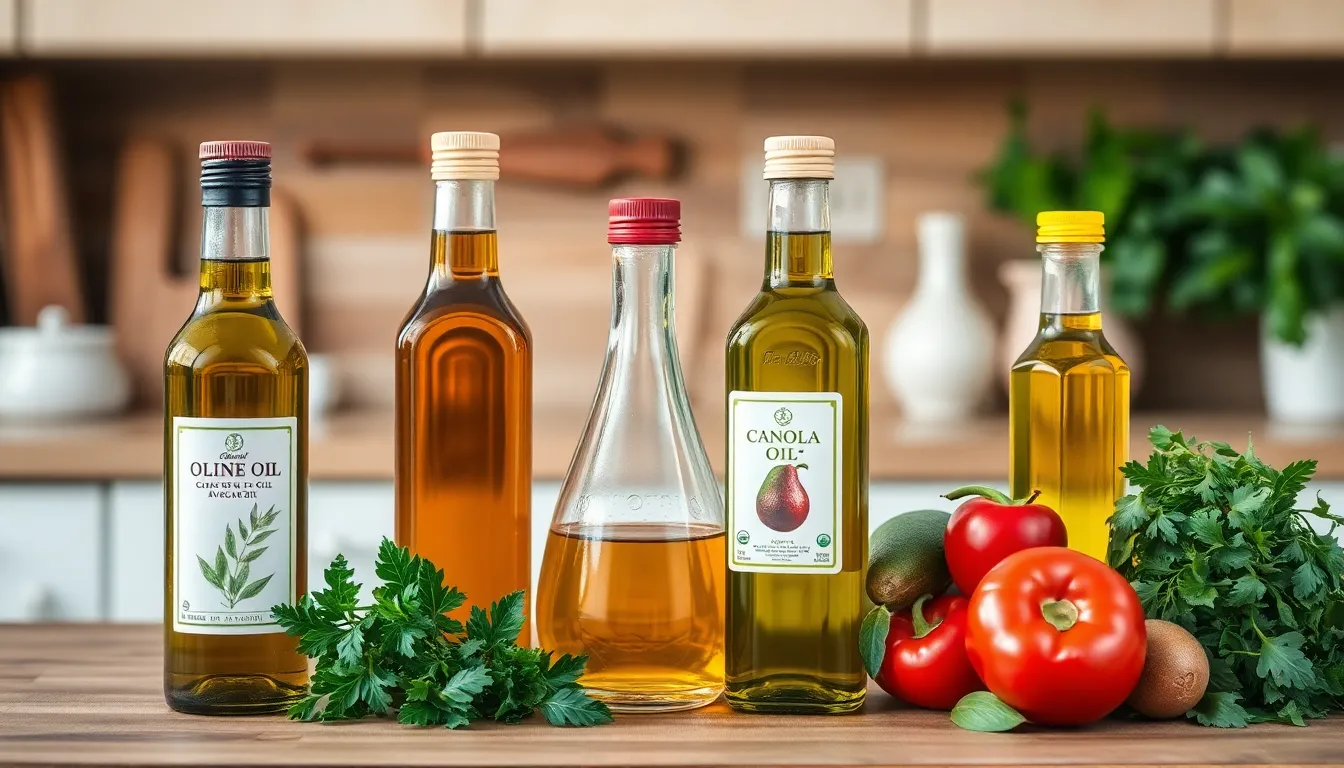Choosing the right cooking oil can feel like navigating a maze while blindfolded. With so many options available, it’s easy to get lost in a sea of labels and health claims. But fear not! This guide will help you cut through the confusion and find the perfect oil for your heart’s desires.
Understanding Cooking Oils
Selecting the right cooking oil involves understanding the various types and their health implications. Oils contain different fatty acid profiles, which impact heart health. Some oils, like olive oil, are rich in monounsaturated fats that promote heart health.
Polyunsaturated fats found in oils such as sunflower and soybean offer beneficial omega-3 and omega-6 fatty acids. These fats contribute to reducing inflammation and supporting cardiovascular health.
Saturated fats, present in coconut oil and palm oil, can raise cholesterol levels if consumed excessively. While these oils may offer some health benefits, moderation is key.
Smoke points differ among oils and play a crucial role in cooking. For instance, oils with high smoke points, like avocado oil and grapeseed oil, work well for frying and high-heat cooking. Oils with lower smoke points, such as flaxseed oil and extra virgin olive oil, suit dressings and low-heat applications.
Nutritional properties offer further insight into oil selection. Omega-3 fatty acids in flaxseed oil support heart and brain health, while the antioxidants in olive oil provide anti-inflammatory benefits.
Using oils that align with dietary needs enhances overall health. For heart-healthy cooking, prioritize oils with beneficial fats and consider their flavor profiles to complement various dishes.
Ultimately, understanding cooking oils helps in making informed culinary choices. Choosing oils that foster heart health and suit individual preferences elevates meal preparation and bolsters well-being.
Health Benefits of Cooking Oils

Cooking oils offer various health benefits, emphasizing the importance of selecting the right ones for heart health.
Heart Health Considerations
Oils high in monounsaturated fats, like olive oil, support heart health by reducing bad cholesterol levels. Choosing oils with polyunsaturated fats, such as sunflower and soybean oil, can provide essential omega-3 and omega-6 fatty acids. Moderation is key; excessive consumption of saturated fats from coconut and palm oils may increase the risk of heart disease. Incorporating oils with higher polyunsaturated and monounsaturated fat content promotes cardiovascular well-being. Increased intake of beneficial fats can lead to improved heart function and overall health.
Nutritional Profiles
Different oils come with distinct nutritional benefits. Olive oil boasts antioxidants, particularly vitamin E, which aids in reducing inflammation. Flaxseed oil stands out due to its high omega-3 content, beneficial for brain and heart health. Canola oil offers a favorable balance of omega-3 and omega-6 fatty acids, making it a well-rounded option. Avocado oil provides healthy fats along with beneficial nutrients that support digestion and heart health. Opting for oils rich in vitamins, fatty acids, and antioxidants contributes to a balanced diet and enhanced health.
Common Cooking Oils Explained
Understanding different cooking oils helps make informed choices for heart health. Each oil has unique properties and benefits that influence cooking and nutrition.
Olive Oil
Olive oil stands out due to its high levels of monounsaturated fats, which support heart health. Rich in antioxidants, it helps protect against oxidative stress. Extra virgin olive oil offers the most benefits, retaining quality during low-heat cooking. Using it in salad dressings enhances flavor while providing nutritional value. Studies indicate that regular consumption may reduce risks associated with heart disease.
Canola Oil
Canola oil features a balanced fatty acid profile, making it a popular choice for various cooking methods. Low in saturated fats, it has a higher smoke point suitable for frying and baking. Omega-3 and omega-6 fatty acids present in canola oil contribute to overall wellness. Furthermore, its neutral flavor allows versatility across different dishes. Incorporating canola oil into meals supports heart health by promoting healthy cholesterol levels.
Coconut Oil
Coconut oil contains a mix of saturated and unsaturated fats, leading to various health implications. This oil is praised for its medium-chain triglycerides, which may boost metabolism. Some studies link coconut oil consumption to raised HDL cholesterol, deemed the ‘good’ cholesterol. Usage in baking or as a substitute for butter adds a distinct flavor. Moderation remains essential due to its saturated fat content and its cardiovascular effects.
Avocado Oil
Avocado oil boasts a high smoke point, perfect for frying and grilling. It’s rich in monounsaturated fats similar to olive oil, supporting heart health. Also, this oil contains beneficial vitamins and antioxidants like lutein, promoting skin and eye health. Drizzling avocado oil on dishes enhances flavors while providing nutritional benefits. Studies reflect its positive impact on reducing cholesterol levels, making it an excellent choice for heart-conscious individuals.
Factors to Consider When Choosing Cooking Oils
Selecting the right cooking oil involves several key factors. Understanding these elements enhances the ability to make informed decisions regarding heart health.
Smoke Points
Smoke points play a crucial role in cooking oil selection. Oils with high smoke points, like canola and avocado oil, withstand higher temperatures without breaking down. These options suit frying and high-heat cooking methods. Conversely, oils with lower smoke points, such as extra virgin olive oil, work best for dressings and sautéing. Choosing an oil with an appropriate smoke point ensures both flavor integrity and safety.
Flavor Profiles
Flavor profiles significantly affect cooking and dining experiences. Olive oil offers a fruity taste, enhancing Mediterranean dishes. Meanwhile, avocado oil provides a subtle, buttery flavor that complements various cuisines. In contrast, coconut oil brings a tropical essence, ideal for specific recipes. Understanding the flavor characteristics of each oil allows for tailored selections that enhance the overall dish.
Usage in Different Cuisines
Different cuisines utilize oils based on cultural preferences and cooking techniques. Mediterranean cooking frequently features olive oil, prized for its health benefits and robust taste. Asian dishes often incorporate sesame oil, adding a unique depth of flavor. For Mexican cuisine, avocado oil is favored for its versatility and heart-healthy properties. Recognizing these culinary applications communicates the significance of selecting the right oil for each dish.
Conclusion
Choosing the right cooking oil can significantly influence heart health and overall well-being. By understanding the unique properties and benefits of various oils, individuals can make informed decisions that suit their culinary needs. Oils rich in monounsaturated and polyunsaturated fats stand out as heart-healthy options, while being mindful of smoke points and flavor profiles ensures a better cooking experience.
Ultimately, selecting the right cooking oil isn’t just about health; it’s about enhancing the flavors and nutrition of meals. With the right knowledge, anyone can confidently choose oils that support their heart health and elevate their cooking.







